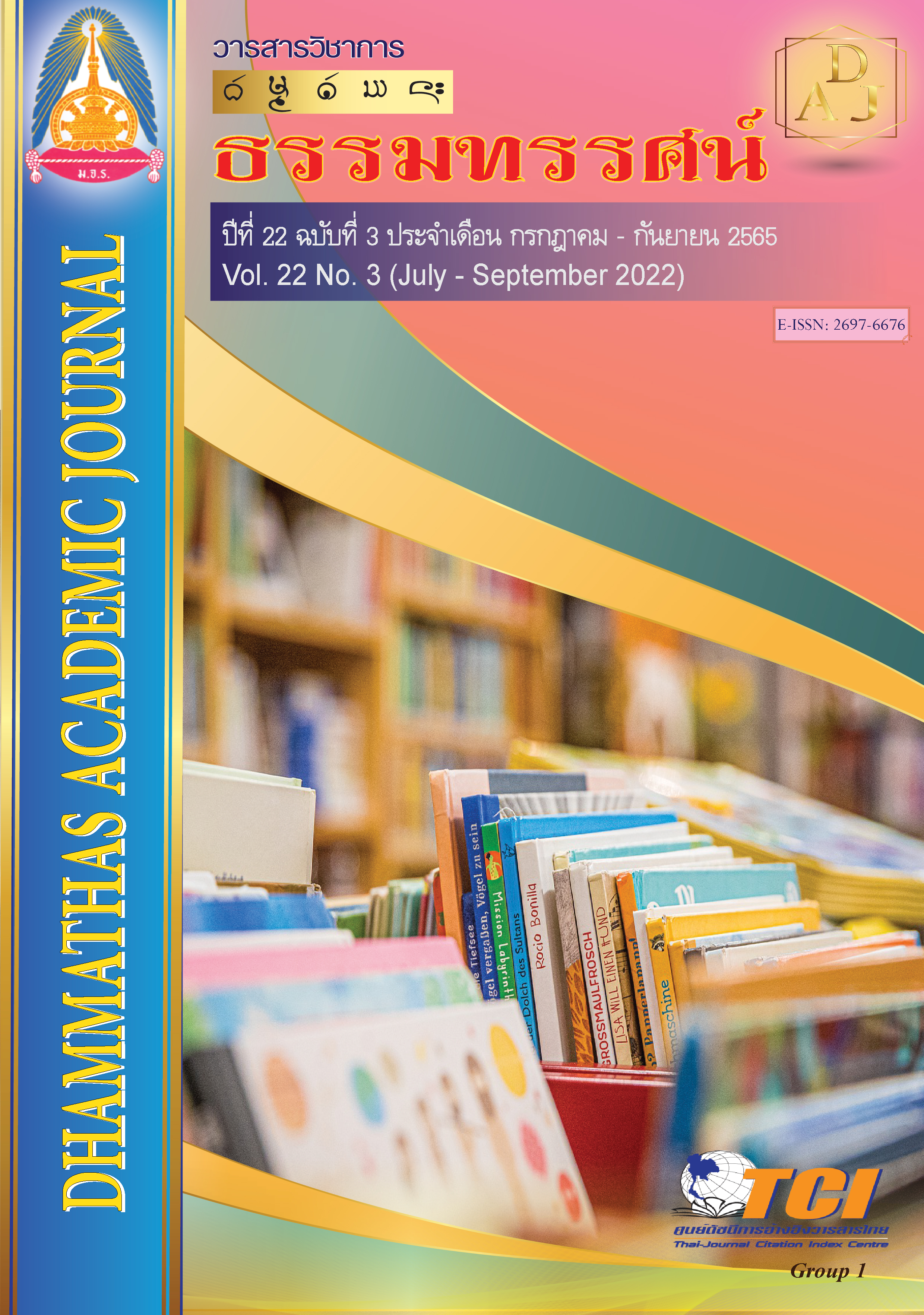Teacher Profession Students’ Advanced Competency Development in Composing Songs, Mo Lam Singing, and Phayha Poem Writing Using the Cooperative Learning Management with STAD Technique and Multimedia
Main Article Content
Abstract
The objectives of this research were: 1) to develop students’ advanced competency in composing songs, Mo Lam singing, and Phayha Poem writing using the cooperative learning management with STAD technique and multimedia to pass the upper high efficiency criterion; 2) to study students’ satisfaction towards composing songs, Mo Lam singing, and Phayha Poem writing using the cooperative learning management with STAD technique and multimedia passing the upper high efficiency criterion. This research was carried out by means of classroom action research according to the preliminary experimental research model, one-group with post-study assessment. The samples consisted of 30 students in the Teacher Professional Certificate Program in the course of ED31203 ‘Foreign Languages and Cultures’. The research instruments consisted of the learning activity management plan, an advanced competency assessment form and a satisfaction assessment form. The obtained data were analyzed using the mean (), standard deviation (S.D.), while the quality results were interpreted according to defined criteria.
The research results were as follows:
1. The development of the students’ advanced competency in composing songs, Mo Lam singing, and Phayha poem writing using the cooperative learning with STAD technique and multimedia in overall could pass the efficiency criterion at the high level ( = 4.44, S.D. = 0.49), and met the setting criterion.
2. The students’ satisfaction towards composing songs, Mo Lam singing, and Phayha poem writing using the cooperative learning with STAD technique and multimedia in overall could pass the efficiency criterion at the high level ( = 4.43, S.D. = 0.44), and met the setting criterion.
Article Details

This work is licensed under a Creative Commons Attribution-NonCommercial-NoDerivatives 4.0 International License.
เพื่อให้เป็นไปตามกฎหมายลิขสิทธิ์ ผู้นิพนธ์ทุกท่านต้องลงลายมือชื่อในแบบฟอร์มใบมอบลิขสิทธิ์บทความ ให้แก่วารสารฯ พร้อมกับบทความต้นฉบับที่ได้แก้ไขครั้งสุดท้าย นอกจากนี้ ผู้นิพนธ์ทุกท่านต้องยืนยันว่าบทความ ต้นฉบับที่ส่งมาตีพิมพ์นั้น ได้ส่งมาตีพิมพ์เฉพาะในวารสาร วิชาการธรรม ทรรศน์ เพียงแห่งเดียวเท่านั้น หากมีการใช้ ภาพหรือตารางของผู้นิพนธ์อื่นที่ปรากฏในสิ่งตีพิมพ์อื่นมาแล้ว ผู้นิพนธ์ต้องขออนุญาตเจ้าของลิขสิทธิ์ก่อน พร้อมทั้ง แสดงหนังสือที่ได้รับการยินยอมต่อบรรณาธิการ ก่อนที่บทความจะได้รับการตีพิมพ์References
กัญจนา ลินทรัตนศิริกุล. (2550). การวิจัยเชิงทดลองในเอกสารการเรียนรู้การทำวิจัยด้วยตนเอง. กรุงเทพฯ: มหาวิทยาลัยสุโขทัยธรรมาธิราช.
จรินทร อุ่มไกร และไกยสิทธิ์ อภิระติง (2562). การพัฒนาสื่อดิจิทัลร่วมกับเทคโนโลยีความจริงเสริมโดยอาศัยการเรียนรู้แบบร่วมมือด้วยเทคนิค STAD ในรายวิชาคอมพิวเตอร์ชั้นประถมศึกษาปีที่ 6. วารสารโครงงานวิทยาการคอมพิวเตอร์และเทคโนโลยีสารสนเทศ มหาวิทยาลัยราชภัฏมหาสารคาม, 5(2), 18-27.
ชุติมา กสิฤกษ์. (2564). การพัฒนาทักษะการออกเสียงภาษาจีนของนักเรียนชั้นประถมศึกษาปีที่ 5 โดยใช้การเรียนรู้ด้วยเทคนิค KWL PLUS ร่วมกับสื่อประสม. (วิทยานิพนธ์ศึกษาศาสตรมหาบัณฑิต). ขอนแก่น: มหาวิทยาลัยภาคตะวันออกเฉียงเหนือ.
ดุสิต ขาวเหลือ. (2549). การบูรณาการการใช้สื่อประสมและสื่อหลายมิติเพื่อการสอนและการเรียนรู้. ชลบุรี: มหาวิทยาลัยบูรพา.
ทิศนา แขมมณี. (2562). ศาสตร์การสอนองค์ความรู้เพื่อการจัดกระบวนการเรียนรู้ที่มีประสิทธิภาพ. (พิมพ์ครั้งที่ 23). กรุงเทพฯ: จุฬาลงกรณ์มหาวิทยาลัย.
บุญชม ศรีสะอาด. (2545). การวิจัยเบื้องต้น. (พิมพ์ครั้งที่ 7). กรุงเทพฯ: สุวีริยาสาส์น.
วิทยา สัตย์จิตร, ดวงเดือน สุวรรณจินดา และทวีศักดิ์ จินดานุรักษ์. (2563). ผลการจัดการเรียนรู้วิทยาศาสตร์แบบซิปปาร่วมกับการเรียนรู้แบบร่วมมือด้วยเทคนิค STAD ที่มีต่อผลสัมฤทธิ์ทางการเรียน เรื่อง แสงและการเคลื่อนที่และความสามารถในการทำงานเป็นกลุ่มของนักเรียนชั้นประถมศึกษาปีที่ 3 กลุ่มโรงเรียนเครือข่ายเกาะกลางคลองยาง จังหวัดกระบี่. วารสารศึกษาศาสตร์ มหาวิทยาลัยทักษิณ, 20(1), 147-161.
สำนักงานคณะกรรมการวัฒนธรรมแห่งชาติ. (2537). การเสริมสร้างวินัย: คู่มือแนะแนวทางการปฏิบัติ. กรุงเทพฯ: คุรุสภาลาดพร้าว.
สำนักงานเลขาธิการสภาการศึกษา. (2560). แผนการศึกษาแห่งชาติ พ.ศ. 2560-2579. กรุงเทพฯ: พริกหวาน กราฟฟิค.
สุรางค์ โค้วตระกูล. (2565). จิตวิทยาการศึกษา. กรุงเทพฯ: จุฬาลงกรณ์มหาวิทยาลัย.
เอกวิทย์ แก้วประดิษฐ์. (2545). เทคโนโลยีศึกษา หลักการและแนวคิดสู่การปฏิบัติ. สงขลา. มหาวิทยาลัยทักษิณ.
เอกวิทย์ ณ ถลาง. (2540). ภูมิปัญญาชาวบ้านสี่ภูมิภาค: วิถีชีวิตและกระบวนการเรียนรู้ของชาวบ้าน. นนทบุรี: มหาวิทยาลัยสุโขทัยธรรมาธิราช.
Conger, L. A. and Kanungo R. N. (1998). Kanungo Chairsmatie Leadership in Organizations. Thousand Oaks, CA: Sage.
Dave, R. (1967). Psychomotor domain. Berlin: International Conference of Educational Testing.
Johnson, D. W., & Johnson, R. (1974). Instructional structure: Cooperative, competitive, or individualization. Review of Educational Research, 44, 213-240.
Likert, R. (1970). Technique for the measurement of attitudes. In G.F Summer (Ed.) Attitudes measurement. New York: Rand Me Nlly.
Slavin, R. E. (1978). Student teams and comparison among equals: Effects on academic performance and student attitudes. Journal of Educational Psychology, 70(4), 532-538.
_______. (1995). Cooperative Integrated Reading and Composition. Menlo Park, CA: Addison-Wesley
White, R. (1959). Motivation Reconsidered: The Concept of Competence. Psychological Review, 66, 297-333.

